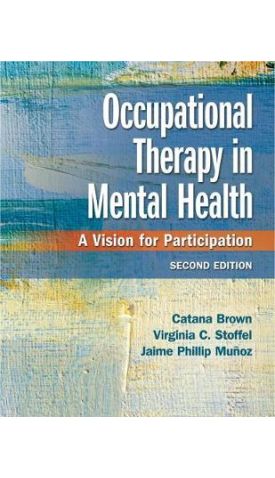אנו משתמשים ב-Cookies כדי לשפר את החוויה שלך. כדי לקיים ההנחיה החדשה של e-Privacy, עלינו לבקש את הסכמתך להגדיר את ה-Cookies. קבלת מידע נוסף.
570.00 ₪
Occupational Therapy in Mental Health: A Vision for Participation 2e
570.00 ₪
ISBN13
9780803659162
יצא לאור ב
Pennsylvania
מהדורה
2nd Revised edition
עמודים / Pages
928
פורמט
Hardback
תאריך יציאה לאור
28 בפבר׳ 2019
A person-centered, recovery-oriented, and occupation-based approach to mental health across the lifespan. This revised text continues to embrace the confluence of person, environment, and occupation in mental health as its organizing theoretical model, emphasizing the lived experience of mental illness and recovery.
A person-centered, recovery-oriented, and occupation-based approach to mental health across the lifespan.
This revision of a well-loved text continues to embrace the confluence of person, environment, and occupation in mental health as its organizing theoretical model, emphasizing the lived experience of mental illness and recovery. Rely on this groundbreaking text to guide you through an evidence-based approach to helping clients with mental health disorders on their recovery journey by participating in meaningful occupations. Understand the recovery process for all areas of their lives-physical, emotional, spiritual, and mental-and know how to manage co-occurring conditions.
Content has been updated to follow the most current DSM-5 information and best practices from the evidence. New chapters highlight changes in occupational therapy practice and settings, and additional assessment and intervention content strengthens the applicability to current practice.
Uses the Person-Environment-Occupation (PEO) model as a framework to promote the full participation in the lives of individuals with mental illness and those struggling with psychosocial issues related to their disabilities.
- Features first-person "The Lived Experience," narratives that give voice to the experience of living with a mental illness
- Incorporates "Photo Voice" features, a blend of photography and personal stories that enable individuals to record their visions and experiences to promote dialogue about important issues.
- Addresses co-occurring conditions such as depression, stroke, substance abuse and spinal cord injury, and attention deficit disorder and learning disabilities.
- Promotes best practices with "Evidence-Based Practice "boxes that synthesize significant research and implications for practice.
- Offers extensive information on theory and evidence-based interventions
- Employs active learning strategies to facilitate the application of knowledge, skills, and attitudes essential for mental health and psychosocial interventions.
- Addresses occupational therapy in a variety of practice settings for individuals from all cultures across the life span.
- Discusses non-diagnosis-based populations, such as the homeless, as well as the continuum of care from institution or hospital to the community.
| מהדורה | 2nd Revised edition |
|---|---|
| עמודים / Pages | 928 |
| פורמט | Hardback |
| ISBN10 | 0803659164 |
| יצא לאור ב | Pennsylvania |
| תאריך יציאה לאור | 28 בפבר׳ 2019 |
| תוכן עניינים | I. FOUNDATIONS 1. Recovery 2. The Unfolding History of Occupational Therapy in Mental Health 3. Person-Environment-Occupation Model 4. Person-Centered Evaluation 5. Evidence-Based Practice in Mental Health II. THE PERSON Section 1. Introduction 6. Introduction to the Person Section 2. Diagnosis 7. Autism 8. Intellectual Disabilities 9. Attention Deficit /Hyperactivity Disorder 10. Disruptive, Impulse-control, and Conduct Disorders 11. Eating Disorders 12. Personality Disorders 13. Mood Disorders 14. Anxiety, Obsessive Compulsive, and Related Disorders 15. Trauma and Stressor-Related Disorders 16. Schizophrenia and Schizoaffective Disorder 17. Substance Abuse and Co-Occurring Disorders 18. Neurocognitive Disorders (Dementia) 19. Psychosocial Concerns with Physical Disabilities Section 3. Performance Skills 20. Cognition 21. Cognitive Beliefs 22. Sensory Processing 23. Coping and Resilience 24. Motivation 25. Emotion 26. Communication and Social Skills 27. Pain 28. Time Use and Habits III. THE ENVIRONMENT Section 1. Introduction 29. Introduction to the Environment Section 2. Environments 30. The Public Policy Environment 31. Stigma: Implications for Health and Recovery 32. Families and Family-Focused Practice 33. Sociocultural Perspectives in Mental Health Practice 34. The Neighborhood and Community 35. The Home Environment: Permanent Supportive Housing Section 3. Practice Settings 36. Early Intervention: A Practice Setting for Infant and Toddler Mental Health 37. Early Psychosis Programs for Adolescents and Young Adults 38. Peer-led Services 39. Mental Health Practice in Criminal Justice Systems 40. State Hospitals 41. Supporting Individuals through Crisis to Community Living: Meeting a Continuum of Service Needs 42. Homeless and Women's Shelters 43. Wraparound Services: Children and Families 44. Occupational Therapy: Serving Service Members and Veterans 45. Integrated Behavioral Health and Primary Care 46. Applying Entrepreneurial Skills in Mental Health Practice IV. OCCUPATION Section 1. Introduction 47. Introduction to Occupation and Co-occupation Section 2. Occupations 48. Wellness 49. Activities of Daily Living and Instrumental Activities of Daily Living 50. Occupational Therapy's Role in School Mental Health 51. Student: Adult Education 52. Work as Occupation 53. Volunteering and Service Occupations 54. Social Participation 55. Leisure and Play 56. Rest and Sleep 57. Spiritual Occupation Appendix A. Person-Environment-Occupation Analysis Template B. Index of Assessments C. Index of Interventions D. Index of Practice Models and Theoretical Approaches Glossary Index |




Login and Registration Form